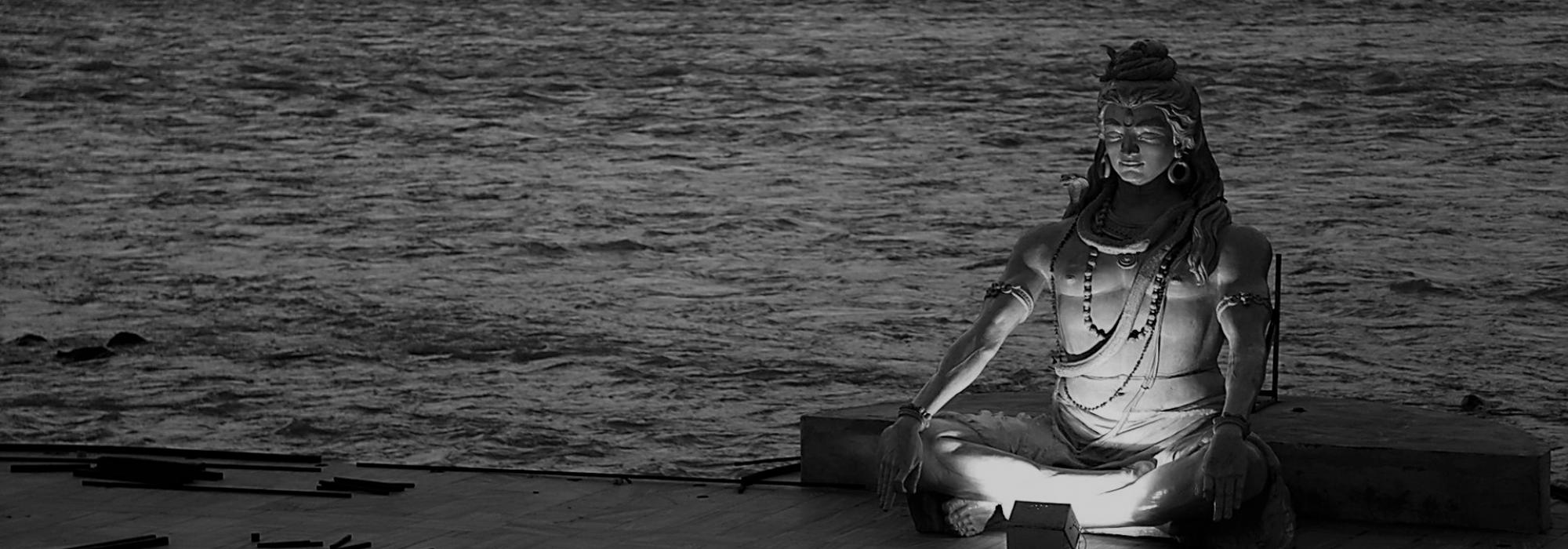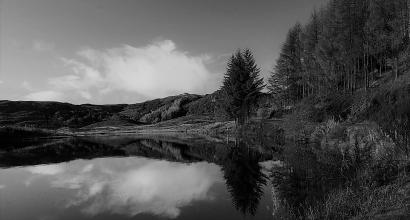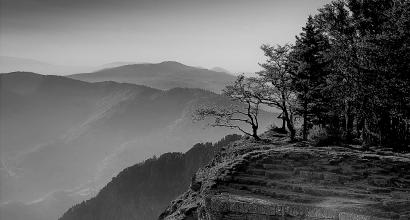Gaṅgāvataraṇam
This work, in eight Sargas, describes the story of how the celestial river, Gaṅgā, descended to the world of mortals. The potted contents of this poem, which like Śivalīlārṇava, also fulfils the criteria for a Mahākāvya, are given below. Also given are the translations of some fine verses
Sarga 1
The first Sarga is introductory in nature and contains verses that praise poets of yore, delineate the importance of poetic genius in the creation of literature, describe the role of connoisseurs and critics, criticize the wicked and the ignorant, make fun of bad poets and give a sketch of the poet’s illustrious family and the reason why he chose to write a poem on Gaṅgā. The story proper begins from the sixtieth verse with a description of king Bhagīrtatha's rule. Some verses from this Sarga are translated below –
व्यासमेव स्तुमो यस्य वाचं गणयितुं विधिः |
विषीदति वृषाङ्केण विलूने पञ्चमानने ||
All praises to Vyāsa whose utterances the creator, Brahma, sets out to count but feels he is handicapped without the fifth face which Śiva lopped off. (1.2)
भारतीषु कवीन्द्राणां यावती सुकुमारता |
तावती काव्यमर्मज्ञसंमर्दैकसहिष्णुता ||
Though she is soft, the poet’s muse will still not yield to the critic’s squeeze. (1.13)
नार्थमुल्लिखितुं यत्नो नापि ग्रन्थयितुं गिरः |
श्रवणात्प्रागनाक्षेपः श्रोतुरभ्यर्थ्यते परम् ||
We do not want them to help us with meaning. Nor do we seek their help in stringing words together. What we poets ask of our connoisseurs is just this much – “Don’t raise objections before listening to what we have to say”. (1.20)
स्तुत्यं न स्तुवते मूढाः पद्यं यत्तन्न दारुणम् |
अपदे यत्प्रशंसन्ति तन्मे मर्माणि कृन्तति ||
It doesn’t pain me if fools don’t appreciate what is appreciable. It pains me when they appreciate what is not. (1.27)
भान्ति शिष्याः पुरो यस्य पाणिविन्यस्तपुस्तकाः |
तत्सूक्तिजाह्नवीपूरत्रासेनेव धृतप्लवाः ||
The students of Veṅkaṭeśvaramakhī, my master, carry bundles of palm-leaves in both their hands as if they were oars to help them cross the flood of his eloquence. (1.53)
तस्यासन्प्राक्तना एव सेनामन्त्र्यनुजीविनः |
नवं यशो नवः कोशो नवं राज्यं च केवलम् ||
Bhagīrtatha’s army, ministers and dependents were all from the past but what was new were his fame, treasury and kingdom. (1.73)
Sarga 2
The second Sarga starts with Bhagīrtatha learning from the elders in his family about the fate which befell his ancestors, the sons of Sagara, who went searching for their father’s sacrificial horse and ended up being burnt to ashes by sage Kapila for wrongly calling him a thief. The royal sage, Vasiṣṭha, then informs Bhagīrtatha that the only way to redeem his ancestors of their pitiable condition was to bring the celestial river, Gaṅgā, to earth and then offer oblations to them with her waters. Neither Aṃśumān nor Dilīpa, Aṃśumān’s son, could succeed in accomplishing this mission. And it was now left for Bhagīrtatha to complete the task. Bhagīrtatha entrusts the responsibilities of his kingdom to his ministers and proceeds to perform penance in honor of Brahma under whose care the river now was. With the commencement of his penance also commences summer.
उद्यतां किमपि वक्तुमथैनां गर्वितां कमलभूरुपलभ्य |
शापमित्थमसृजज्जलरूपा सद्य एव भवती भवितेति ||
“When Gaṅgā was about to say something, Brahma thought she was acting smart and cursed her to become a river” (2.11)
सा ततो गिरिसुता कलयन्ती तं च निग्रहमनुग्रहमेव |
ऊर्मिभिः प्रलयसागरघोरैरुत्पपात कवलीकरणाय ||
“But Gaṅgā considered this curse as a boon in disguise and with her huge waves, formidable like the oceans at the time of Pralaya, she attacked everything on her way”. (2.12)
आश्रमं नगरमासनदर्भान्भद्रपीठमुटजं मणिवेश्म |
संभ्रमाद्व्यवहरन्क्षितिपालोऽलज्जत त्रिचतुराणि दिनानि ||
During the first three or four days of his life as an ascetic, the king would erroneously refer to his hermitage as city, his seat of holy Darbha grass as throne and his hut as bungalow and then realizing his mistake, feel embarrassed. (2.23)
यावदित्थमधिकोऽजनि घर्मस्तावदस्य तपसा विजजृम्भे |
तद्विपाकचकिता दिवि देवास्तापमापुरवनेरपि तीव्रम् ||
As the summer advanced, so too did the king’s penance. And unable to bear the heat of his austerities, gods in the heaven above suffered more than men on earth. (2.56)
Sarga 3
In the third sarga, Gaṅgā informs Bhagīrtatha about the force with which her waters would descend and the impact it would have on the universe. She also requests him to find out a way by which her descent could be made possible and saying so, disappears. When the heart-broken king is unsure about whose help he has to now solicit, Brahma appears before him and asks him to propitiate Śiva. The king then selects a spot on Mount Kailāsa and begins to meditate once more, now with the object of securing Śiva’s grace. This canto has descriptions of Śच्च्iva’s greatness, the Himalayas and Mount Kailāsa.
पतत्युदारे पयसाम्भरे मम प्रसह्य राजन्गिरिराजमौलिषु |
समुत्पतच्छीकरवर्षदुर्दिनं चतुर्मुखो धाम किमावसेन्निजम् ||
“When my flooding waters will fall with full force upon the peaks of the Himalayas, throwing up a dense shower of droplets, how can Brahma manage to stay in his abode?” (3.5)
अचिन्तयित्वा कृतिगौरवं विधेरपि त्यजन्ती करुणां शरीरिषु |
पताम्यहं यद्यपि कुत्र वा भवन्भवान्निवापाञ्जलिमाचरिष्यति ||
“Even if I, disrespecting the creator’s creation, agree to descend without as much as caring for anybody, please tell me where you would stand and offer oblations to your forefathers”. (3.7)
यदि त्वलङ्घ्यं गुरुशासनं त्वया यतस्व भूमाववतारणे मम |
स्मृता स्मृता संनिदधामि तावदित्युदीर्य तं दिव्यनदी तिरोदधे ||
“If you feel that the words of your elders must not be transcended then try to find a means by which you can fetch me to earth. Just think of me and I shall appear before you”. So saying, Gaṅgā disappeared. (3.26)
कियत्यसौ तात वियन्नदी भवेत्कियन्ति सर्वाणि जगन्ति वा पुनः |
स्वयं यदि प्राक्तनपुण्ययोगतः स एव ते संरभते महेश्वरः ||
“If Śiva himself, by the dint of your good karma, would rush forward to help you, Gaṅgā, or for that matter, even the three worlds, would be reduced to non-issues”. (3.42)
Sarga 4
In the fourth Sarga are described Bhagīrtatha’s penance, the advent of winter, the arrival of Śiva along with his retinue, Bhagīrtatha’s request to Śiva and Śiva’s readiness to receive the flow of Gaṅgā.
बभौ तेन समुत्क्षिप्तो वातुर्ज्याघातलाज्छितः |
जित्वा तपोभिर्ब्रह्मर्षीन्जैत्रस्तम्भ इवोच्छ्रितः ||
Bhagīrtatha’s arm, marked by scars from his bowstring, was raised in penance and it looked like a pillar of victory erected by the king after defeating great sages by his austerities. (4.2)
तप्यमाने पुनस्तस्मिंस्तत्यजुः क्रमशो भयम् |
क्षुद्रस्वस्वपदस्वामिपददुर्विदग्धा दिवौकसः ||
Seeing the severity of his penance, the gods, proud of the petty offices they owned, gradually overcame their apprehensions. (4.6)
The above verse suggests that the gods were initially apprehensive that the king wanted to usurp their positions but seeing the magnitude of his austerities realized that he was aiming for something higher.
फालानलशिखोत्तप्तपाणिपद्मा कपर्दिनः |
कथमप्यतिचक्राम हिमं हैमवती तदा ||
The daughter of Himalayas, warming her palms in the heat of Śiva’s fiery third eye, spent the winter somehow. (4.17)
आकृष्टयोः कुमाराभ्यामैभवैयाघ्रचर्मणोः |
सम्भ्रान्ता पतिमावव्रे सव्यानाग्रेण पार्वती ||
Seeing her sons snatch away their father’s coats - elephant’s and tiger’s hides, Pārvatī hurriedly covered him with the tip of her upper garment. (4.30)
तावतस्तपसो दातुमपश्यन्नुचितं फलम् |
हरः प्रतस्थे तं द्रष्टुमाधमर्ण इव ह्रिया ||
Not knowing what fruit he should bestow on his devotee that would match the severity of his penance, Śiva started from his abode, overcome with shame like a debtor. (4.39)
हेरम्बकन्धरालम्बिदूर्वाग्रग्रासकौतुकात् |
गन्तुमुन्नमितग्रीवं गृह्णन्तमसकृन्मृगम् ||
The Lord was trying to restrain the deer in his hand from grazing on the holy Dūrvā grass which his son, Gaṇeśa, was wearing on his neck. (4.69)
आबद्ध्य चर्म वैयाघ्रमपसार्य च बालकौ |
सावष्टम्भः क्षितावास्त सज्जीभूतो वृषध्वजः ||
Tightening the tiger-skin and asking his sons to move aside, the Lord put his weight on solid ground, ready to receive the celestial torrent. (4.92)
Sarga 5
The fifth Sarga describes Gaṅgā’s descent from the abode of Brahma in to the matted locks of Śiva. The havoc created by the river is described in several verses that are a proof of the poet’s skill in creating humor. There is also a dramatic element in these verses that lends them an extra charm. Some of these verses are translated below:
सा निवेदयितुमात्मनिर्गमं संनिकर्षमुपजग्मुषी विधेः |
व्याजहार विनयावधीरणव्यक्तगर्वगरिमोष्मला गिरः ||
Deciding to inform Brahma about her travel, she approached him and spoke these words that revealed a total absence of humility and an exuberance of pride. (5.3)
अस्ति नन्वयमयुग्मलोचनः स्काटिकाचलचरो वनेचरः |
धर्तुमिच्छति स नाम मामकं त्वत्परीक्षितमहारयं पयः ||
I have heard that a certain hunter, with an uneven number of eyes, roams on the peaks of Kailāsa. It seems he is keen to stop my flow whose force you have already tested. (5.4)
यात यूयमपयात च क्षणं देवता निजनिजालयांस्ततः |
कौतुकं तु यदि वोऽस्ति वीक्षितुं कोणमावासत निर्भया दिशाम् ||
Move aside, O gods, or better still, go back to your respective homes. If you are interested to know what will happen, give up fear and just gather at some corner of this universe. (5.12)
विश्वसर्गचतुरोऽपि पद्मभूर्न प्रतिव्यधित तत्र किञ्चन |
स्वैरमस्तु कुशलः परापदि स्वापदि त्वकुशलोऽखिलो जनः ||
When the river started to flood, even Brahma, the creator of this universe, couldn’t think of a way out. One may exhibit whatever cleverness one has when others are in trouble but when it comes to one’s own troubles, everyone is equally crippled. (5.21)
कपर्दमपरापगासलिलसेकसान्द्रीकृतं
विधुन्वति सविभ्रमं पशुपतौ विकीर्णास्ततः |
क्वचित्सुरपुरन्ध्रयः क्वचन यक्षविद्याधराः
क्वचिच्च परमर्षयः समवलन्त संमूर्छिताः ||
When the Lord shook his locks that were made wet by the waters of the divine river, a few damsels from heaven, a few Yakṣas, a few Vidyādharas and a few sages got scattered and lost consciousness. (5.64)










































